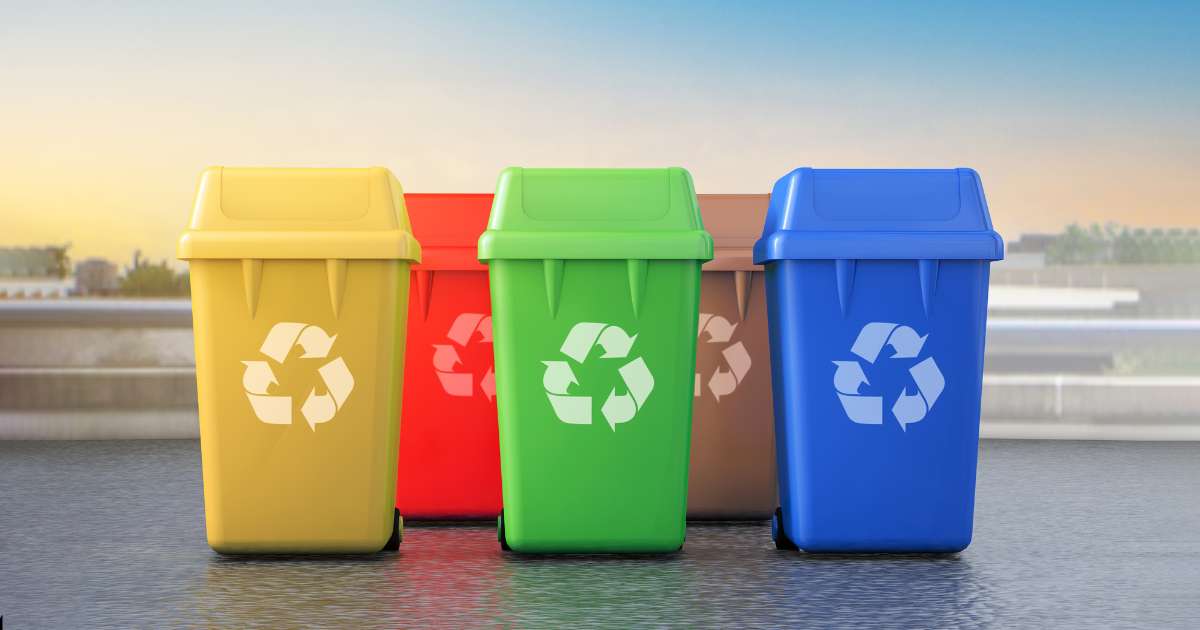Every day, businesses of all sizes produce a considerable amount of waste, making responsible waste management crucial. Protecting the environment isn’t just a noble goal—it’s essential for a sustainable future.
While managing waste and recycling can be costly, there are effective strategies to keep those expenses in check. Before diving into cost-saving methods, it’s important to understand the core objectives of waste management. Let’s explore these key goals:
Minimize Waste Production
At the heart of effective waste management is the goal of reducing the amount of waste we generate. By focusing on reducing, recycling, and reusing materials, businesses can significantly cut disposal costs.
Reducing waste is the starting point. Effective waste segregation and strong recycling initiatives play a key role in achieving this goal. By lowering the amount of waste that ends up in landfills or incinerators, we not only cut disposal costs but also contribute to a circular economy.
In this model, products and materials are kept in use as long as possible, then recovered and regenerated at the end of their lifecycle. This approach conserves resources and lessens environmental impact, fostering a sustainable and regenerative future for coming generations.
To better manage your waste, it’s important to choose the right dumpster size for your needs. Learn more about dumpster sizes to reduce waste efficiently.
Reduce Pollution
Another vital objective is to lessen the environmental impact of waste. For instance, food waste is a significant concern, as it decomposes and releases methane, a potent greenhouse gas. Managing food scraps is crucial for reducing pollution.
Composting organic waste is an effective solution that not only diverts waste from landfills but also transforms it into nutrient-rich soil for agriculture and gardening. Responsible waste management helps mitigate pollution, enhance air quality, and combat climate change.

Protect Groundwater Sources
Improperly managed waste can severely affect our water sources. For safe disposal of hazardous materials, visit our page on hazardous waste management. Without proper containment, waste can leach harmful chemicals into rivers, oceans, and soil, causing pollution and contamination.
This endangers marine life and threatens clean water supplies. A well-executed waste management system is crucial to safeguarding these vital water sources and preserving the delicate ecosystems that depend on them.
By preventing waste from contaminating water, we protect both the environment and public health.
Ensure Sustainability
Beyond cost savings, it’s crucial to consider the broader goal of sustainability. Effective waste management conserves natural resources, striking a balance between economic growth and environmental preservation.
By adopting sustainable practices, businesses ensure they don’t deplete resources needed for future generations. This approach also fosters innovation and the development of new waste treatment technologies.
Investing in research can improve recycling processes, enhance waste-to-energy conversion, and create valuable products from waste materials, reducing reliance on finite resources and supporting a sustainable economy.
Promote Public Awareness
Raising public awareness is key to effective waste management. Educating communities about responsible waste disposal and recycling fosters a culture of sustainability.
Public engagement and educational campaigns inspire people to adopt greener habits, such as recycling, composting, and reducing single-use plastics.
An informed and motivated public is more likely to participate in waste management programs, leading to significant waste reduction. Promoting awareness helps build a collective effort towards a cleaner, more sustainable future. Explore our guide on waste reduction to learn how to foster a culture of sustainability.

Promote social equality, Equity, and Inclusion
Equitable and inclusive waste management ensures all communities benefit from clean and healthy environments. Knowing the hidden dangers of clutter can be crucial for promoting health and safety. Implementing fair and accessible waste collection systems is vital for this goal. When everyone has access to proper waste disposal and recycling services, we create a more just society.
This approach not only improves public health but also empowers communities to play an active role in environmental protection, addressing environmental justice issues by ensuring no community bears an undue burden of waste and pollution.
Drive Economic Growth Through Resource Efficiency
Waste management also aims to drive economic growth by enhancing resource efficiency. By converting waste into resources through recycling or energy recovery, businesses can generate new revenue streams and reduce dependence on raw materials.
This not only boosts the economy but also promotes sustainable resource use. Efficient waste management can create jobs in recycling, composting, and other waste-related industries, contributing to economic growth.
Enhance Public Health and Safety
Protecting public health and safety is a crucial goal of waste management. Improper waste disposal can spread diseases, attract pests, and create hazardous conditions.
Safe waste collection, treatment, and disposal reduce health risks and create safer living conditions. Proper waste management also prevents environmental disasters, such as landfill fires or toxic leaks, which can have severe health impacts.

Support Compliance with Regulations and Standards
Another objective is to ensure compliance with environmental regulations and standards. Regulatory guidelines for waste disposal, recycling, and treatment protect the environment and public health.
Adhering to these regulations helps businesses avoid legal penalties and demonstrates their commitment to corporate social responsibility, enhancing their reputation and building trust with customers and stakeholders.
Encourage Innovation in Waste Management Technologies
Lastly, waste management seeks to foster innovation in new technologies and practices. By investing in research and development, businesses and governments can find more efficient ways to manage waste, reduce environmental impact, and recover valuable resources.
Exploring advanced recycling technologies, waste-to-energy solutions, and sustainable materials prepares us for future needs, ensuring continuous improvement in waste management practices.
Frequently Asked Question
What are the primary objectives of waste management?
The primary objectives of waste management are to minimize waste production, reduce pollution, protect groundwater sources, ensure sustainability, promote public awareness, and foster social equity and inclusion. These goals aim to protect the environment, conserve natural resources, and create a sustainable future.
How can businesses minimize waste production?
Businesses can minimize waste production by implementing waste reduction strategies such as reducing, reusing, and recycling materials. This includes proper waste segregation, encouraging recycling programs, and adopting a circular economy model where products and materials are reused and regenerated.
What role does waste management play in reducing pollution?
Waste management plays a crucial role in reducing pollution by ensuring that waste, especially organic waste like food scraps, is properly managed. Composting organic waste reduces the amount of waste sent to landfills, preventing the release of methane gas a potent greenhouse gas into the atmosphere.
How does waste management protect groundwater sources?
Waste management protects groundwater sources by preventing waste from contaminating water bodies and the soil beneath them. Proper waste containment and disposal practices are essential to safeguarding rivers, oceans, and other water sources, thus preserving clean water for human consumption and protecting marine life.
What is the connection between waste management and sustainability?
Waste management is closely linked to sustainability as it focuses on conserving natural resources and reducing the environmental impact of waste. By promoting sustainable practices such as recycling, waste-to-energy conversion, and resource recovery, waste management helps create a balance between economic growth and environmental protection.
Why is public awareness important in waste management?
Public awareness is vital in waste management because it encourages individuals and communities to adopt sustainable waste disposal and recycling practices. Educational campaigns and community engagement inspire people to actively participate in waste management programs, leading to a significant reduction in overall waste.
How does waste management promote social equity and inclusion?
Waste management promotes social equity and inclusion by ensuring that all communities, regardless of socioeconomic status, have access to proper waste disposal and recycling services. This approach helps create a cleaner, healthier environment for everyone and addresses environmental justice issues by preventing the disproportionate impact of waste on vulnerable communities.
How can waste management help businesses save costs?
Effective waste management helps businesses save costs by reducing the volume of waste they generate, which lowers disposal fees. By implementing recycling and composting programs, businesses can decrease the amount of waste sent to landfills, leading to lower tipping fees. Additionally, practices such as waste reduction and resource recovery can turn waste into valuable resources, creating potential revenue streams and reducing the need for raw materials.
What are some best practices for reducing waste in a business setting?
Best practices for reducing waste in a business setting include conducting waste audits to identify areas for improvement, implementing a comprehensive recycling program, and encouraging employees to adopt waste-reducing behaviors. Businesses can also reduce packaging materials, choose products with minimal environmental impact, and establish waste reduction goals. Engaging in a circular economy model, where products are designed for reuse and recycling, can further minimize waste.
What technologies are available for advanced waste management?
Advanced waste management technologies include anaerobic digestion for organic waste, which converts waste into biogas and digestate; waste-to-energy systems that generate energy from waste; and automated sorting technologies that improve recycling efficiency. Additionally, innovations in recycling processes, such as chemical recycling and advanced material recovery facilities, enhance the ability to recover valuable materials from waste.
Conclusion
Effective waste management is more than just a necessity—it’s essential for building a sustainable future. By focusing on minimizing waste, reducing pollution, protecting groundwater, ensuring sustainability, promoting public awareness, and fostering social equity, waste management plays a crucial role in safeguarding our environment and conserving resources.
These objectives not only help businesses save costs but also contribute to the well-being of society. Embracing responsible waste management practices is a powerful step toward a cleaner, more sustainable world.
To learn more about contributing to waste reduction and cost savings, visit the Waste Control, Inc. website and discover practical solutions tailored to your needs.
